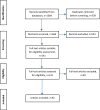Patients' and professionals' views related to ethical issues in precision medicine: a mixed research synthesis
- PMID: 34465328
- PMCID: PMC8406914
- DOI: 10.1186/s12910-021-00682-8
Patients' and professionals' views related to ethical issues in precision medicine: a mixed research synthesis
Abstract
Background: Precision medicine development is driven by the possibilities of next generation sequencing, information technology and artificial intelligence and thus, raises a number of ethical questions. Empirical studies have investigated such issues from the perspectives of health care professionals, researchers and patients. We synthesize the results from these studies in this review.
Methods: We used a systematic strategy to search, screen and assess the literature for eligibility related to our research question. The initial search for empirical studies in five data bases provided 665 different records and we selected 92 of these publications for inclusion in this review. Data were extracted in a spreadsheet and categorized into different topics representing the views on ethical issues in precision medicine.
Results: Many patients and professionals expect high benefits from precision medicine and have a positive attitude towards it. However, patients and professionals also perceive some risks. Commonly perceived risks include: lack of evidence for accuracy of tests and efficacy of treatments; limited knowledge of patients, which makes informed consent more difficult; possible unavailability of access to precision medicine for underprivileged people and ethnic minorities; misuse of data by insurance companies and employers, potential of racial stigmatization due to genetic information; unwanted communication of incidental findings; changes in doctor-patient-relationship through focusing on data; and the problem that patients could feel under pressure to optimize their health.
Conclusions: National legislation and guidelines already minimize many risks associated with precision medicine. However, from our perspective some problems require more attention. Should hopes for precision medicine's benefits be fulfilled, then the ethical principle of justice would require an unlimited access to precision medicine for all people. The potential for autonomous patients' decisions must be greatly enhanced by improvements in patient education. Harm from test results must be avoided in any case by the highest possible data security level and communication guidelines. Changes in the doctor-patient relationship and the impact of precision medicine on the quality of life should be further investigated. Additionally, the cost-effectiveness of precision medicine should be further examined, in order to avoid malinvestment.
Keywords: Access; Benefits; Data security; Discrimination; Genomic medicine; Informed consent; Knowledge; Personalized medicine; Precision medicine; Stigmatization.
© 2021. The Author(s).
Conflict of interest statement
The authors declare that they have no competing interests.
Figures
References
Publication types
MeSH terms
LinkOut - more resources
Full Text Sources
Medical



